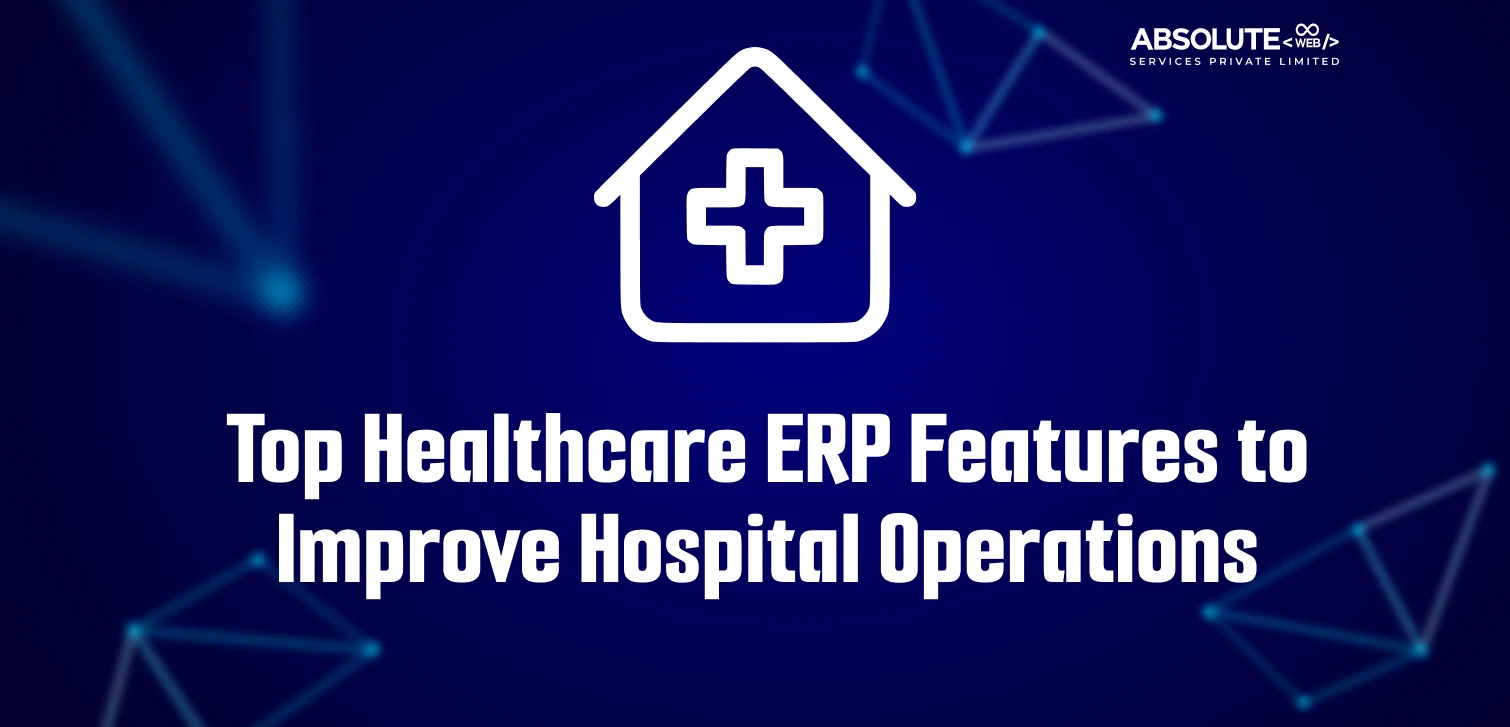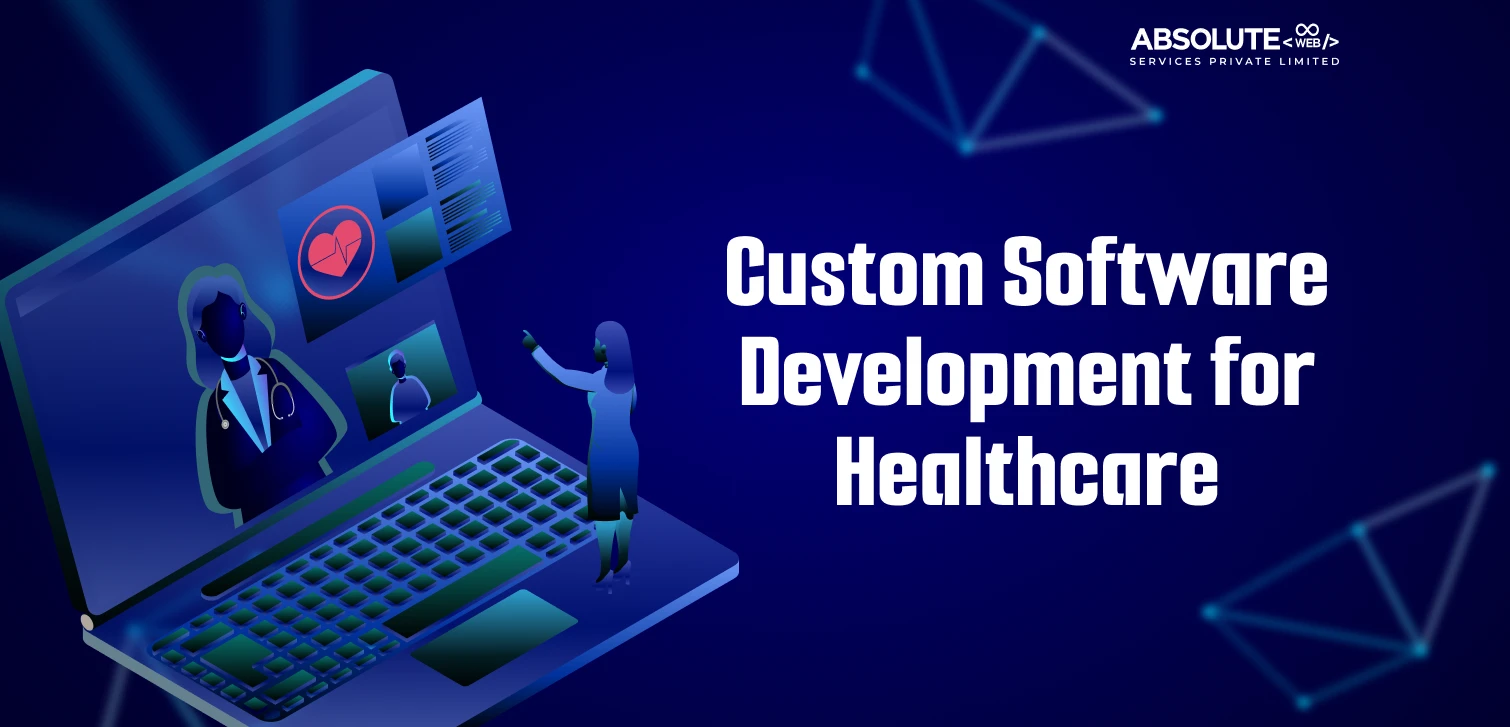In today’s healthcare landscape, hospitals and medical institutions must operate efficiently and deliver seamless, high-quality patient care. To achieve this, many healthcare providers are investing in ERP (Enterprise Resource Planning) software designed specifically for the sector. Healthcare ERP systems or Healthcare ERP Features unify operational functions, helping hospitals streamline workflows, manage resources effectively, and improve patient outcomes.
This article explores key healthcare ERP features that enhance hospital operations. It also highlights how Absolute Web, a leading ERP software provider, supports international healthcare organizations with tailored, reliable ERP solutions.
Why Healthcare ERP Systems Matter
A healthcare ERP system is a centralized solution that connects various operational functions within a hospital. This integration eliminates information silos, promotes data accuracy, and increases overall operational efficiency. ERPs also offer robust analytical tools to help hospital administrators make informed, data-driven decisions. For international healthcare providers, implementing a robust ERP is essential to stay competitive and comply with regional regulations.
Absolute Web specializes in developing healthcare ERP systems tailored to the needs of international healthcare providers. Our ERP expertise enables us to build software that streamlines hospital management and significantly improves patient care.
Top Features of a Healthcare ERP System
- Patient Management
- Efficient patient management is crucial for any hospital. An ERP system can track patient admissions, discharge information, and movement across departments. It integrates Electronic Health Records (EHR) to ensure a seamless flow of information between departments, enhancing patient care and improving coordination.
- How Absolute Web Can Help: Our healthcare ERP solutions incorporate advanced patient management modules that allow medical staff to access real-time patient data, reducing errors and improving decision-making.
- Inventory and Supply Chain Management
- Hospitals manage a wide array of resources, including medications, medical equipment, and consumables. A healthcare ERP tracks inventory levels, monitors stock expiration dates, and ensures that medical supplies are restocked when necessary. This feature reduces waste, avoids shortages, and optimizes procurement.
- How Absolute Web Can Help: We design healthcare ERP solutions that streamline inventory management with real-time tracking and automated restocking alerts, helping hospitals reduce costs and maintain uninterrupted patient care.
- Financial Management
- Hospitals require effective financial management to handle billing, payments, insurance claims, and payroll. A healthcare ERP automates these processes, providing transparent financial tracking, improved cash flow, and minimized errors.
- How Absolute Web Can Help: Absolute Web’s ERP solutions offer customized financial modules to help hospitals manage complex billing, insurance claims, and payroll seamlessly, improving financial efficiency and accuracy.
- Human Resource Management (HRM)
- The healthcare industry depends on skilled personnel to function efficiently. An ERP system’s HRM module aids in workforce planning, payroll, attendance tracking, and recruitment. It helps manage and retain qualified staff, contributing to high-quality patient care.
- How Absolute Web Can Help: Our ERP solutions provide integrated HRM tools that make it easy to manage hospital personnel, allowing HR teams to allocate staff effectively and boost productivity.
- Regulatory Compliance
- Compliance with international healthcare standards and local regulations is essential for any healthcare provider. ERP systems can be tailored to ensure adherence to legal and industry-specific requirements, such as data privacy laws and health information security protocols.
- How Absolute Web Can Help: We understand the intricacies of regulatory compliance across various countries. Our ERP solutions are designed to align with global standards, helping hospitals avoid costly penalties and ensure safe patient data handling.
- Appointment Scheduling
- An ERP system with integrated appointment scheduling simplifies booking and reduces patient wait times. Patients can schedule, reschedule, or cancel appointments seamlessly, ensuring smooth interactions with healthcare providers and reducing missed appointments.
- How Absolute Web Can Help: Our ERP solutions include a user-friendly appointment management system that integrates with EHRs, allowing for efficient scheduling and improving patient satisfaction.
- Data Analytics and Reporting
- Healthcare providers need insights to make informed decisions. ERP systems provide data analytics and reporting tools that allow administrators to analyze patient outcomes, operational efficiency, and financial performance.
- How Absolute Web Can Help: Our ERP software integrates powerful analytics tools, giving healthcare providers access to critical insights that aid in decision-making and performance improvement.
- Telemedicine Integration
- With the rise of telemedicine, an ERP system that integrates telemedicine platforms offers convenience for patients and providers. This feature allows healthcare providers to conduct virtual consultations, manage patient records, and monitor health data remotely.
- How Absolute Web Can Help: We incorporate telemedicine capabilities into our ERP systems, enabling hospitals to offer remote healthcare services, which is particularly beneficial for hospitals looking to expand patient outreach.
The Absolute Web Advantage: Delivering Customized Healthcare ERP Solutions
At Absolute Web, we understand the challenges hospitals face and the need for ERP solutions that are both flexible and secure. With expertise in developing customized ERP systems, we empower international healthcare providers by creating robust, user-friendly solutions tailored to their operational needs. Our ERP software helps hospitals optimize workflows, manage resources effectively, and comply with international standards, all while ensuring data security and regulatory compliance.
Absolute Web’s healthcare ERP solutions are engineered to support high-volume operations while enhancing the patient care experience. We work closely with our clients to understand their unique requirements and deliver ERP systems that enable them to achieve sustainable growth.
How Absolute Web Can Help You Implement the Right ERP Solution
Implementing a healthcare ERP solution is a transformative process, and Absolute Web is dedicated to ensuring a seamless transition. We provide comprehensive ERP development services, from initial consultation and design to deployment and ongoing support. With a commitment to high-quality software, we help healthcare providers operate efficiently and stay ahead in an increasingly competitive industry.
Partner with Absolute Web Today
If you’re looking to improve hospital operations with a customized healthcare ERP solution, reach out to Absolute Web. Our team of experts is ready to develop a solution tailored to your institution’s specific needs, enabling you to deliver top-notch healthcare services efficiently.
Frequently Asked Questions (FAQs)
What is a Healthcare ERP System and How Does it Improve Hospital Operations?
A Healthcare ERP system integrates various hospital operations like patient management, inventory control, finances, and HR. It streamlines workflows, reduces costs, and improves data accuracy by unifying resource tracking. With a healthcare ERP, hospitals ensure seamless communication, better resource allocation, and improved patient care.
What Are the Key Features of a Healthcare ERP?
Key features of a healthcare ERP include patient management, inventory control, financial management, HRM (Human Resource Management), compliance, scheduling, analytics, and telemedicine. These features not only streamline hospital operations but also automate tasks, reduce redundancies, and provide data-driven insights for better decision-making. Moreover, by centralizing key hospital functions, a healthcare ERP ensures smoother coordination between departments and enhances the quality of patient care. In addition, it improves resource allocation, reduces operational costs, and boosts overall efficiency. At Absolute Web, we specialize in building tailored healthcare ERP solutions for international clients, helping them enhance both operational efficiency and patient care, ensuring that they remain competitive and compliant in the ever-evolving healthcare landscape.
How Can Absolute Web Help with Healthcare ERP Features Implementation?
Absolute Web supports healthcare providers with ERP features implementation through comprehensive, end-to-end solutions. These solutions encompass everything from consultation and design to development, deployment, and ongoing support. We take a customized approach, tailoring each ERP system to meet the unique needs of each hospital, ensuring full compliance with local regulations while simultaneously boosting overall operational efficiency. Moreover, by focusing on user-friendly interfaces and strong data security, Absolute Web’s ERP solutions not only help hospitals streamline workflows but also empower them to deliver high-quality care that meets the needs of patients and healthcare providers alike.
Why Is Patient Management Important in a Healthcare ERP System?
Patient management is undoubtedly a key feature in healthcare ERP systems. Firstly, it centralizes patient data, which significantly streamlines admissions and tracks patient movement within the hospital. In addition, real-time access to patient records allows medical staff to make more informed decisions, coordinate effectively across departments, and ultimately provide quicker, more accurate care. As a result, this improves operational efficiency and enhances patient outcomes. Absolute Web’s ERP solutions integrate advanced patient management modules, ensuring that data remains accurate and patient flow is smooth. Consequently, hospitals can deliver better care, leading to higher patient satisfaction.
What Benefits Do Hospitals Gain from Inventory Management in a Healthcare ERP?
Effective inventory management in a healthcare ERP system helps hospitals track medications, supplies, and equipment, reducing stockouts and waste. Automated alerts for low stock levels allow hospitals to restock efficiently, ensuring essential supplies are always available. This reduces disruptions and improves care quality. Moreover, Absolute Web’s ERP solutions feature robust inventory management, minimizing costs and avoiding shortages. As a result, patient care standards remain consistent and reliable.
How Does Financial Management in ERP Improve Hospital Financial Health?
The financial management feature in a healthcare ERP system automates billing, insurance claims, and payroll processing, reducing errors and improving transparency. It also provides clear financial data, helping hospitals optimize cash flow, enhance billing accuracy, and ensure regulatory compliance. As a result, Absolute Web’s ERP solutions include customized financial modules that improve efficiency and transparency, leading to better financial health.
How Does Absolute Web Ensure Compliance in Healthcare ERP Systems?
Absolute Web understands that international healthcare providers need ERP systems that adhere to diverse regulatory standards, including data privacy and health information security laws. Consequently, our ERP solutions are developed with compliance in mind. In fact, we incorporate customizable modules that adapt to both regional and international regulations. As a result, healthcare providers can meet legal requirements without compromising operational efficiency. Ultimately, this helps them avoid costly penalties while building trust with patients.
What Role Does Data Analytics Play in Healthcare ERP?
Data analytics in healthcare ERP systems allow hospitals to analyze patient outcomes, resource utilization, and financial performance. These insights enable hospital administrators to make informed decisions, optimize staffing, improve resource allocation, and enhance patient care. Absolute Web’s healthcare ERP solutions include powerful analytics tools, providing healthcare providers with actionable data that helps improve both operational efficiency and patient outcomes.
How Does Absolute Web Integrate Telemedicine into Healthcare ERP Systems?
With the growing importance of remote healthcare, Absolute Web seamlessly integrates telemedicine capabilities into healthcare ERP systems. This feature allows hospitals to conduct virtual consultations, access patient records remotely, and monitor health data, thereby enhancing patient outreach and accessibility. Moreover, our telemedicine-integrated ERPs are not only user-friendly but also secure, ensuring healthcare providers have a reliable platform for remote interactions and continuous care. Consequently, this integration helps hospitals meet the evolving needs of patients while maintaining high standards of care.
What Are the Advantages of Appointment Scheduling in Healthcare ERP?
Appointment scheduling in a healthcare ERP system reduces patient wait times, minimizes scheduling conflicts, and improves the overall patient experience. By automating appointment scheduling and sending reminders, hospitals can increase appointment adherence and optimize patient flow. Absolute Web’s ERP solutions offer an intuitive appointment scheduling module that integrates with EHR, creating a smooth experience for patients and efficient scheduling for staff.
Final Thoughts
The right healthcare ERP solution significantly improves hospital operations, enhancing patient satisfaction and resource management. By partnering with Absolute Web, international healthcare providers gain access to advanced ERP technology tailored to their needs. Our solutions help streamline operations, ensure compliance, and elevate patient care.
Contact Absolute Web today to discover how our ERP solutions can help transform your healthcare facility.



